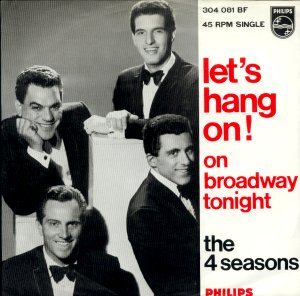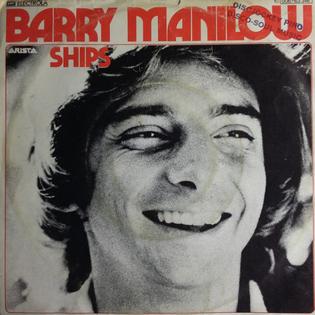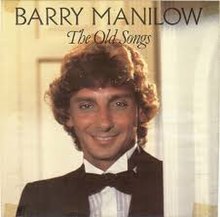
"I Write the Songs" is a popular song written by Bruce Johnston. Barry Manilow's version reached number one on the Billboard Hot 100 chart in January 1976 after spending two weeks atop the Billboard adult contemporary chart in December 1975. It won a Grammy Award for Song of the Year and was nominated for Record of the Year in 1977. Billboard ranked it as the No. 13 song of 1976.

"Can't Smile Without You" is a song written by Christian Arnold, David Martin and Geoff Morrow, and recorded by various artists including Barry Manilow and the Carpenters. It was first recorded and released by David Martin as a solo single in 1975. The version recorded by Manilow in 1977 and released in 1978 is the most well-known.

"Daybreak" is an uptempo pop song by Barry Manilow. It was composed by Manilow and Adrienne Anderson and first appeared on Manilow's 1976 studio album This One's for You.

"Déjà Vu" is a hit 1979 ballad written by Isaac Hayes with lyricist Adrienne Anderson, recorded by Dionne Warwick for her album Dionne which Barry Manilow produced. The song won Warwick a Grammy Award for Best Female R&B Vocal Performance at the 22nd Grammy Awards.

"Cherish" is a pop song written by Terry Kirkman and recorded by the Association. Released in 1966, the song reached number one on the U.S. Billboard Hot 100 in September of that year and remained in the top position for three weeks. Billboard ranked the record as the No. 7 song of 1966, and later as No. 2, after a revision of the year-end charts. It was certified Gold by the RIAA in the US in 1966. In Canada, the song also reached number one.

"Let's Hang On!" is a song composed by Bob Crewe, Sandy Linzer, and Denny Randell that was popularized by the Four Seasons in 1965.

"Tryin' to Get the Feeling Again" is a song written by David Pomeranz that became a top 10 hit for Barry Manilow in 1976. It was first recorded by the Carpenters in 1975, but their version was not released until 1994 on their 25th anniversary CD, Interpretations: A 25th Anniversary Celebration. Pomeranz also recorded the song for his 1975 album It's in Every One of Us.

"Somewhere Down the Road" is a popular song written by Cynthia Weil and Tom Snow and most famously recorded in 1981 by Barry Manilow. Weil wrote the song's lyrics and Snow wrote the melody.
"What About Me?" is a 1984 song written by Kenny Rogers, producer David Foster, and singer-songwriter Richard Marx. It was recorded by Rogers, Kim Carnes, and James Ingram as a trio song from Rogers' Platinum certified 1984 album of the same name.

"Even Now" is a 1978 song by American adult contemporary and pop music singer Barry Manilow. It is the title track from his 1978 album, and Manilow wrote the music and co-produced the track with Ron Dante. The words were written by Marty Panzer.
"Read 'Em and Weep" is a rock music song composed by Jim Steinman. It was originally written for Meat Loaf and recorded for his 1981 album, Dead Ringer, the second of only two tracks on the album produced by Steinman and Jimmy Iovine.

"It's a Miracle" is a 1975 single by Barry Manilow and was the second release from his album, Barry Manilow II. "It's a Miracle" went to number twelve on the U.S. Billboard Hot 100 and was Manilow's second number one on the U.S. Easy Listening chart, spending one week at number one in April 1975. The single also peaked at number fifteen on the disco/dance chart, and was the first of four entries on the chart. "It's a Miracle" was followed by "Could It Be Magic".

"This One's for You" is the title track from the 1976 album by Barry Manilow with words and music by Manilow and Marty Panzer. The song peaked at number 29 on the Billboard Hot 100, and at number one on the Easy Listening chart, reaching the top position for one week in November 1976, Manilow's fifth number one overall on that chart.

Andy is the thirty-sixth studio album by American pop singer Andy Williams, released in the fall of 1976 by Columbia Records. Williams is not as focused on covering pop hits and standards on this album and instead relies mainly on original or lesser-known songs. In the liner notes for the album's 2002 CD release, writer Richard M. Erickson explains that the album "was recorded at six different studios to accommodate Andy's touring schedule. One recording session was at a portable studio set up at a Marriott hotel."

"I Made It Through the Rain" is a song that became a hit after it was recorded by American singer Barry Manilow, also included on his 1980 album, Barry. The song was originally recorded in 1979 by its co-writer Gerard Kenny who composed it with Drey Shepperd about a struggling musician who never gives up. Manilow heard the song and revised the lyric with Jack Feldman and Bruce Sussman to make the song about the everyday person's struggles, rather than those of a profession.

When Will I See You Again is an album by American pop singer Johnny Mathis that was released in March 1975 by Columbia Records and was again predominantly composed of covers of recent hit songs by other artists.

"Ships" is a song written and originally performed by British musician Ian Hunter. The song was first released on Hunter's fourth solo album, You're Never Alone with a Schizophrenic in March 1979, and later released as a single in August 1979. Hunter's release of the single never made the charts. The song is said to be about Ian's relationship with his father.

"Lonely Together" is a 1981 song recorded by Barry Manilow. It was written by Kenny Nolan. The song was the second single release from Manilow's 1980 album, Barry.

"After You" is a song recorded by Dionne Warwick for her 1979 album Dionne: released as the album's third single in the spring of 1980, "After You" would peak at number 65 on the U.S. Billboard Hot 100. It also reached number 10 on the Adult Contemporary chart.

"Don't Throw It All Away" is a song written by British musician Gary Benson and first released by the Shadows on their 1975 album Specs Appeal. Benson released his version as a single later the same year, which reached number 20 on the UK Singles Chart in the fall of 1975.


















